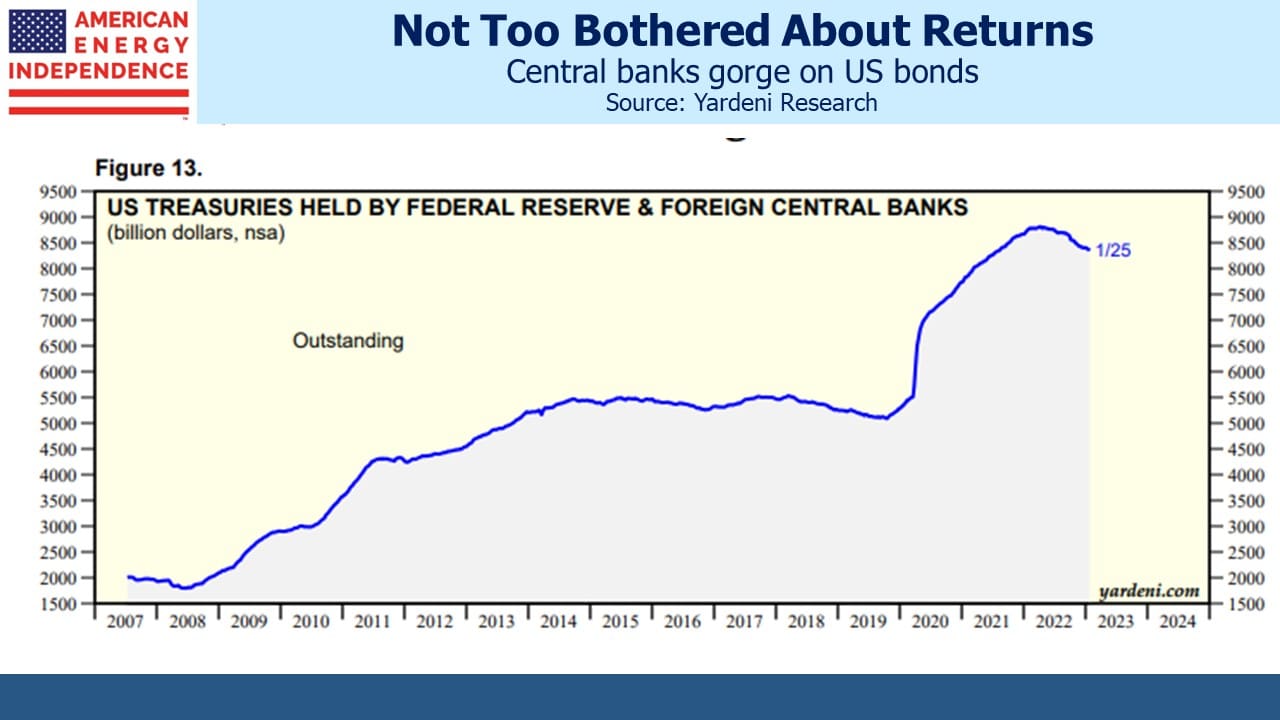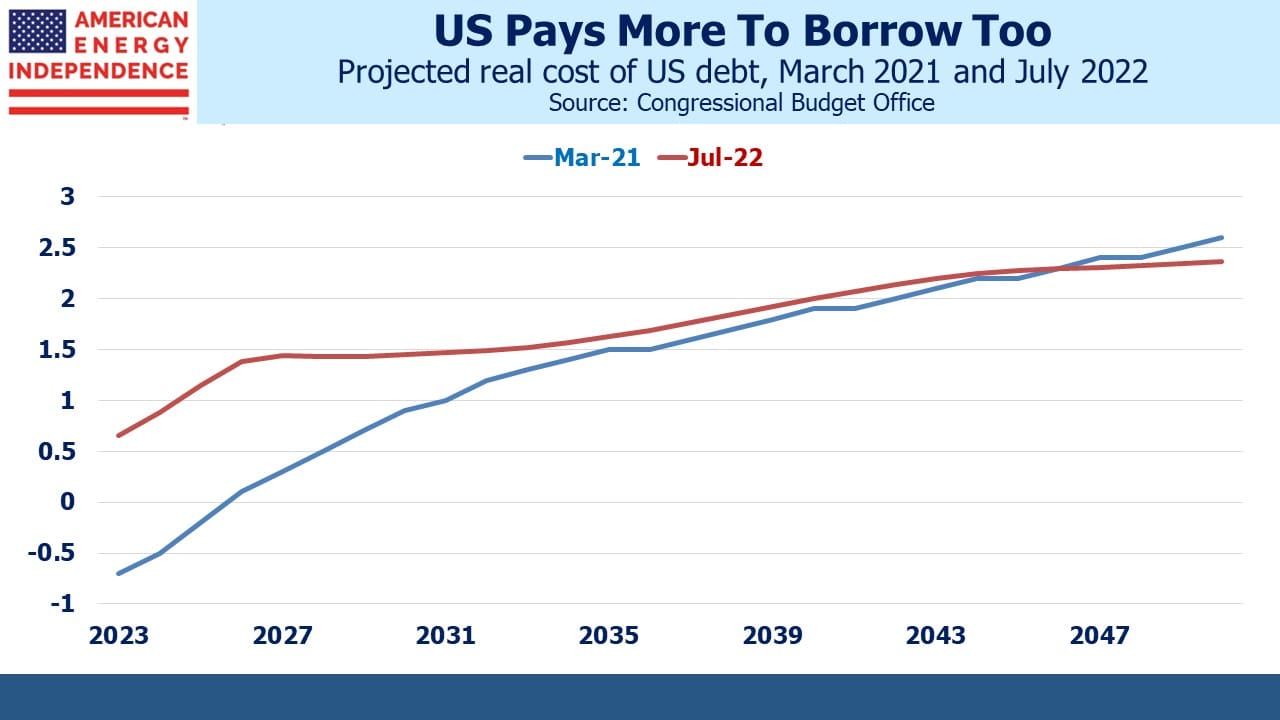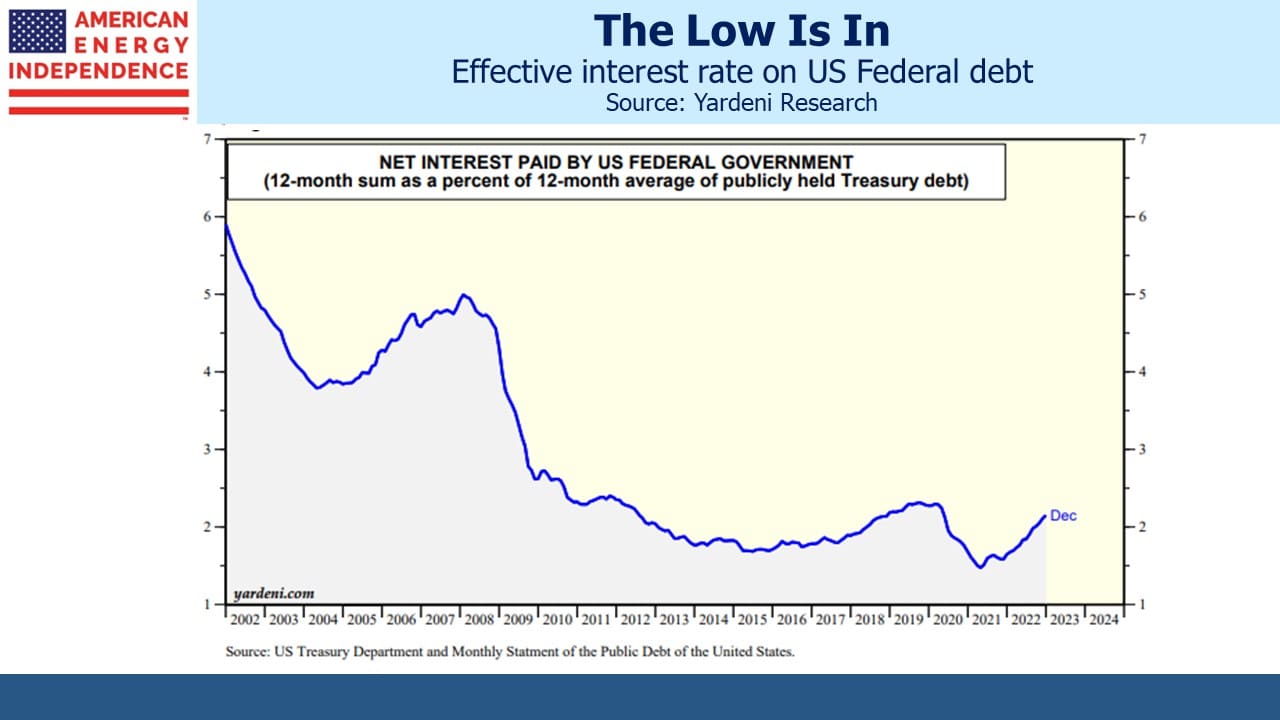More Than A Fiscal Agent

/
Wednesday’s soothing words on inflation from Fed chair Jay Powell seemed a distant memory after Friday’s blockbuster employment report. The market liked hearing that , “…the disinflationary process has started.” More relevant now is his warning that, “The historical record cautions strongly against prematurely loosening policy.” Investors are Confronting Asymmetric Risks, as we noted on Wednesday.
Lost among the inflation questions was Powell’s reminder that the Federal Reserve is Treasury’s “fiscal agent.” This was in response to a question about the debt ceiling and whether the Fed had done its own “analysis of any legal constraints” that might impede or affect its actions during the fiscal brinkmanship that would accompany a stand-off over raising the debt ceiling.
A refusal by Congress to authorize more borrowing is a crisis of its own making, a rare but significant error in the US constitution. Whenever Congress approves spending it’s axiomatic that includes the intent and ability to pay for it, through taxes, borrowing or asset sales. The debt limit should be raised by whatever’s necessary to fund spending that’s been approved. The refusal by Congress to treat the two issues as one may one day lead us all off a fiscal cliff led by miscalculating innumerate Tea Party Republicans.
The Fed is much more than Treasury’s fiscal agent. They are the biggest holder of US government debt ($5.4TN), a position they’re unlikely to exit in the foreseeable future. In total, central banks own $8.3TN is US debt, almost 40% of the total. When long term bond yields stubbornly fail to rise to levels that might induce purchases from a return-oriented investor, it’s because the biggest holders have non-commercial objectives. Foreign central bank holdings have been stable in absolute terms but falling as a percentage of debt outstanding because, well, there’s a lot more debt.
Warnings of US fiscal catastrophe have been around for at least as long as my 43-year career. A perpetual trade deficit creates lots of dollars needing a home, and a fiscal deficit creates lots of debt seeking buyers. It is to the benefit of US taxpayers that this benign symmetry has resulted in persistent demand for treasuries. We should hope it continues.
Low or negative real yields are the savior of profligate governments. Elevated inflation has temporarily slashed the real cost of financing our debt. Fed policy has been to ensure such a benefit is fleeting. 2% inflation is not the optimal policy for our fiscal outlook, and positive real rates won’t help. The only time in living memory when there was political consensus to improve our fiscal balance was in the early 1990s when ten year notes yielded as high as 8%. Since then, the tangible costs of profligacy have receded, along with any political gain to be had from tackling it.
The Congressional Budget Office (CBO) publishes extensive information on our fiscal future complete with charts and figures that leave little room for optimism. A couple of years ago we noted the surprisingly low cost of financing in their projections (see Inflation – Back By Popular Demand).
In subsequent revisions, the real cost of financing has moved up by almost 1% over the next decade. The CBO’s long term inflation outlook is unchanged, but by last July tighter monetary policy had raised the cost of new debt issuance above what the CBO was forecasting in 2021. It’s likely that the next long term budget outlook from the CBO will project even higher real rates.
The Federal Reserve has considerable influence on fiscal policy because of Quantitative Easing (QE), although Jay Powell would prefer not to concede this. Because QE keeps bond yields lower than they would otherwise be, it dampens the concern about fiscal profligacy that the market would otherwise communicate. The CBO and numerous private forecasts are out there for all to see, but QE constrains the urgency. It’s doubtful that we would have had a balanced budget in the 1990s (albeit for one year) if QE had been employed then.
Monetary policy also directly impacts the cost of issuing new debt. The average interest rate paid by the US government has risen quite sharply in the past year. The longer tight policy is required, the worse our fiscal outlook will become. The Fed will continue to pursue their dual mandate, but a graceful exit from QE is probably necessary to generate serious concern about skyrocketing Debt:GDP. Legislating limits on QE would help but is unlikely.
Higher inflation is the only long-term solution to our slowly developing fiscal catastrophe. It’s hard to keep real rates negative when inflation is only 2%. This is why we’re invested in the energy sector.
We have three funds that seek to profit from this environment:

Important Disclosures
The information provided is for informational purposes only and investors should determine for themselves whether a particular service, security or product is suitable for their investment needs. The information contained herein is not complete, may not be current, is subject to change, and is subject to, and qualified in its entirety by, the more complete disclosures, risk factors and other terms that are contained in the disclosure, prospectus, and offering. Certain information herein has been obtained from third party sources and, although believed to be reliable, has not been independently verified and its accuracy or completeness cannot be guaranteed. No representation is made with respect to the accuracy, completeness or timeliness of this information. Nothing provided on this site constitutes tax advice. Individuals should seek the advice of their own tax advisor for specific information regarding tax consequences of investments. Investments in securities entail risk and are not suitable for all investors. This site is not a recommendation nor an offer to sell (or solicitation of an offer to buy) securities in the United States or in any other jurisdiction.
References to indexes and benchmarks are hypothetical illustrations of aggregate returns and do not reflect the performance of any actual investment. Investors cannot invest in an index and do not reflect the deduction of the advisor’s fees or other trading expenses. There can be no assurance that current investments will be profitable. Actual realized returns will depend on, among other factors, the value of assets and market conditions at the time of disposition, any related transaction costs, and the timing of the purchase. Indexes and benchmarks may not directly correlate or only partially relate to portfolios managed by SL Advisors as they have different underlying investments and may use different strategies or have different objectives than portfolios managed by SL Advisors (e.g. The Alerian index is a group MLP securities in the oil and gas industries. Portfolios may not include the same investments that are included in the Alerian Index. The S & P Index does not directly relate to investment strategies managed by SL Advisers.)
This site may contain forward-looking statements relating to the objectives, opportunities, and the future performance of the U.S. market generally. Forward-looking statements may be identified by the use of such words as; “believe,” “expect,” “anticipate,” “should,” “planned,” “estimated,” “potential” and other similar terms. Examples of forward-looking statements include, but are not limited to, estimates with respect to financial condition, results of operations, and success or lack of success of any particular investment strategy. All are subject to various factors, including, but not limited to general and local economic conditions, changing levels of competition within certain industries and markets, changes in interest rates, changes in legislation or regulation, and other economic, competitive, governmental, regulatory and technological factors affecting a portfolio’s operations that could cause actual results to differ materially from projected results. Such statements are forward-looking in nature and involves a number of known and unknown risks, uncertainties and other factors, and accordingly, actual results may differ materially from those reflected or contemplated in such forward-looking statements. Prospective investors are cautioned not to place undue reliance on any forward-looking statements or examples. None of SL Advisors LLC or any of its affiliates or principals nor any other individual or entity assumes any obligation to update any forward-looking statements as a result of new information, subsequent events or any other circumstances. All statements made herein speak only as of the date that they were made. r
Certain hyperlinks or referenced websites on the Site, if any, are for your convenience and forward you to third parties’ websites, which generally are recognized by their top level domain name. Any descriptions of, references to, or links to other products, publications or services does not constitute an endorsement, authorization, sponsorship by or affiliation with SL Advisors LLC with respect to any linked site or its sponsor, unless expressly stated by SL Advisors LLC. Any such information, products or sites have not necessarily been reviewed by SL Advisors LLC and are provided or maintained by third parties over whom SL Advisors LLC exercise no control. SL Advisors LLC expressly disclaim any responsibility for the content, the accuracy of the information, and/or quality of products or services provided by or advertised on these third-party sites.
All investment strategies have the potential for profit or loss. Different types of investments involve varying degrees of risk, and there can be no assurance that any specific investment will be suitable or profitable for a client’s investment portfolio.
Past performance of the American Energy Independence Index is not indicative of future returns.






Leave a Reply
Want to join the discussion?Feel free to contribute!